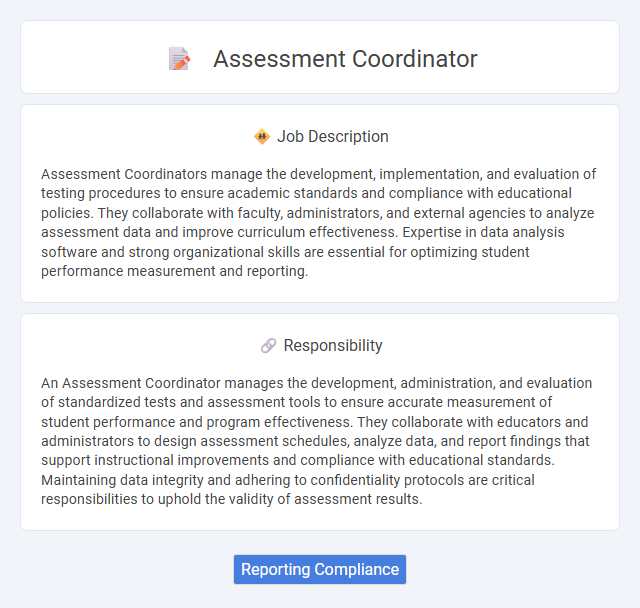
Assessment Coordinators manage the development, implementation, and evaluation of testing procedures to ensure academic standards and compliance with educational policies. They collaborate with faculty, administrators, and external agencies to analyze assessment data and improve curriculum effectiveness. Expertise in data analysis software and strong organizational skills are essential for optimizing student performance measurement and reporting.
Individuals with strong organizational skills and attention to detail are likely to be suitable for the Assessment Coordinator role, as these traits support effective management of assessment logistics and documentation. Candidates who display proficiency in communication and problem-solving may increase their chances of success by efficiently coordinating between various stakeholders. Those struggling with multitasking or high-pressure environments might find this role less fitting, given its demands for timely and accurate assessment administration.
Qualification
Assessment Coordinators typically require a bachelor's degree in education, psychology, or a related field, with many employers preferring candidates who hold a master's degree. Strong knowledge of assessment methodologies, data analysis, and educational standards is essential for effectively coordinating testing and evaluation processes. Proficiency in specialized software for data management and reporting, along with excellent organizational and communication skills, ensures accurate assessment administration and stakeholder collaboration.
Responsibility
An Assessment Coordinator manages the development, administration, and evaluation of standardized tests and assessment tools to ensure accurate measurement of student performance and program effectiveness. They collaborate with educators and administrators to design assessment schedules, analyze data, and report findings that support instructional improvements and compliance with educational standards. Maintaining data integrity and adhering to confidentiality protocols are critical responsibilities to uphold the validity of assessment results.
Benefit
Assessment Coordinators likely improve educational outcomes by ensuring accurate and timely evaluation processes, which can enhance student performance tracking. They probably streamline test administration and data management, contributing to more efficient resource allocation and decision-making for institutions. The role may also support compliance with regulatory standards, reducing risks associated with assessment errors.
Challenge
Assessment Coordinators likely face the challenge of managing complex data from various testing sources, which requires strong organizational and analytical skills. They might encounter difficulties ensuring compliance with ever-changing educational standards and policies, demanding continuous learning and adaptation. There is a probable need to balance conflicting priorities, such as tight deadlines and diverse stakeholder expectations, making effective communication essential.
Career Advancement
Assessment Coordinators play a critical role in overseeing the development, implementation, and analysis of educational assessments, which boosts their expertise in data-driven decision making and project management. Gaining proficiency in standardized testing platforms and educational compliance standards enhances their qualifications, paving the way for advancement into senior roles such as Assessment Manager or Director of Educational Programs. Strong skills in stakeholder communication and strategic planning elevate their potential for career growth within educational institutions or testing organizations.
Key Terms
Reporting Compliance
Assessment Coordinators ensure accurate data collection and timely submission of reports to meet regulatory standards and institutional requirements. They monitor compliance with assessment policies, prepare detailed compliance documentation, and collaborate with academic departments to address gaps. Proficiency in data management systems and knowledge of accreditation criteria are essential for maintaining reporting integrity.
 kuljobs.com
kuljobs.com